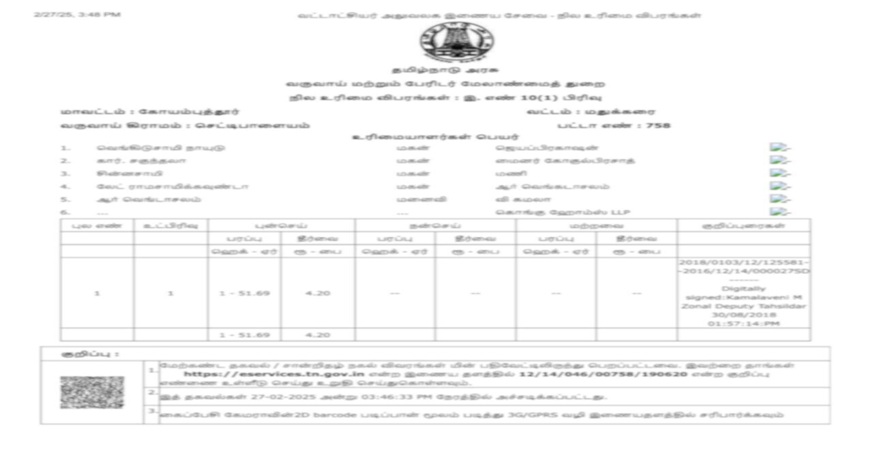Definition
An Encumbrance Certificate (EC) is an official land record document issued by the Sub-Registrar Office (SRO) in Tamil Nadu. It certifies whether a property has any legal dues, mortgages, or claims registered against it. Property buyers use the EC certificate online to confirm clear ownership before purchase or registration.
How to download or get Encumbrance Certificate (EC) Online in Tamil Nadu
With mypatta, citizens can easily check and download property EC online by using survey number check online or property details.
- Open mypatta and log in or sign up if needed.
- Ensure “Tamil Nadu” is selected as the state, then tap the “EC”(Encumbrance Certificate) icon.
- Enter your land details such as Zone, District, Village ,SRO ,Survey and Subdivision number
- Click on Search and EC details will be displayed
- You can now save or share or download this document in PDF on your device.
- EC is available for free. For an official digitally signed copy, Apply for “Signed EC”.
Information Contained in Encumbrance Certificate (EC) in Tamil Nadu
- Property Owner Details – The EC lists the name of the current owner and may also reflect the names of previous owners. This helps establish the chain of ownership and ensures that the person selling the property is the rightful holder.
- Survey Number – Each property is uniquely identified using its survey number, subdivision number, and land survey details. This ensures accurate mapping of the property location and avoids disputes with adjoining lands.
- Transaction History – The EC provides a chronological record of all registered transactions related to the property, such as sale deeds, gift deeds, mortgage deeds, lease deeds, partitions, or settlements. This history is crucial for buyers, banks, and legal verification.
- SRO Name (Sub-Registrar Office) – The certificate mentions the Sub-Registrar Office (SRO) where the property has been registered. Since each property is tied to a jurisdictional SRO, this detail is essential for tracing the registration records.
- Nil Encumbrance Certificate (NEC) – If the property has no liabilities, mortgages, or legal encumbrances during the searched period, a Nil EC (or clean EC) is issued. This is often required for loans, property sales, and legal clearances.
Role and Purpose of Encumbrance Certificate in Tamil Nadu
- Property Purchase Verification – Confirms property is free of legal disputes.
- Bank Loan Requirement – Mandatory for home loans and mortgage approvals.
- Title Transfer – Ensures clean ownership transfer.
- Legal Compliance – Required during property registration at the SRO.
- Government Record Validation – Confirms authenticity of property transactions.
Important Tips and Considerations
- Always check EC in Tamil Nadu before buying or selling land.
- Verify details like survey number check online match your Certified Copy/Nakal.you can get the property documents from mypatta
- Keep a digital copy of property EC certificate for loans and legal processes.
Frequently Asked Questions (FAQs)
1) Can I get an Encumbrance Certificate for agricultural land in Tamil Nadu?
Yes, Encumbrance Certificates can be obtained for all types of properties, including agricultural land.
2) Does the Encumbrance Certificate guarantee ownership of the property?
No, the Encumbrance Certificate only certifies the absence of encumbrances. Ownership should be verified separately through other documents like Certified Copy, which also you can get from “Certified Copy” option in mypatta.
3) What is the validity period of an Encumbrance Certificate?
The Encumbrance Certificate reflects even the latest transactions recorded for a property. Since property transactions can occur at any time, the most recent version is typically required for official use.
4) I cannot find my Encumbrance Certificate on mypatta. What should I do?
Double-check the property details entered. If the issue persists, contact our customer support team or visit the Sub-Registrar’s Office.
5) What is the fee for obtaining the Encumbrance Certificate?
It is available completely free on mypatta. However, if you want a digitally signed copy of Encumbrance Certificate then you can continue with the Signed EC option present in mypatta and place an order for it.
Key Takeaway
- The Encumbrance Certificate (EC) in Tamil Nadu is essential for verifying property ownership and legal status.
- It is required for home loans, property registration, and title verification.
- With mypatta, you can easily apply for EC online, view EC details, and download the EC certificate.
- No need to visit the SRO—mypatta offers a fast, convenient, and paperless EC access process.


